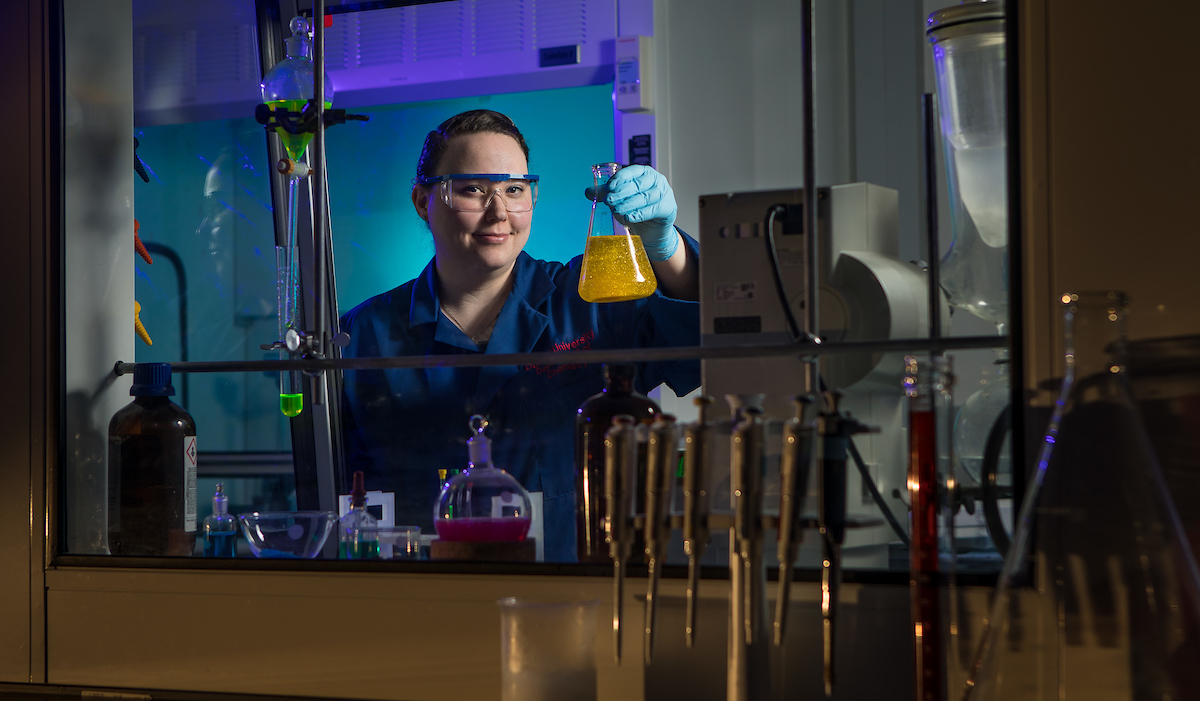 Sara Rocus is the lab and safety manager for the Department of Chemistry in the College of Science and Health at DePaul University. (DePaul University/Jeff Carrion)
Sara Rocus is the lab and safety manager for the Department of Chemistry in the College of Science and Health at DePaul University. (DePaul University/Jeff Carrion)
After earning her Master's in chemistry from DePaul, Sara Rocus began working in the Department of Chemistry as a lab manager and safety officer in 2015. From setting up equipment and lab space for faculty to disposing chemical waste to tracking inventory, every day Rocus ensures DePaul's chemistry labs are safe and ready for use.
"It's a unique job, and a lot of it is set up and tear down, but it's fun," Rocus says. "I enjoy helping our students learn in the same labs I did."
Of her small team of two within the department, Rocus is in charge of all 200 level and higher chemistry labs, which range from organic and inorganic chemistry to biochemistry. In addition to a standard lecture session, these courses include a weekly lab session where students practice theories and conduct experiments to better understand the material. Each week, Rocus sets up dozens of labs, setting the proper equipment in place, such as beakers and Bunsen burners, and making sure the correct chemicals are available and ready.
Once students and faculty are finished with the lab, Rocus cleans up, properly stores the chemicals and equipment, then works with DePaul's
Environment Health and Safety Office to consolidate and dispose any chemical, and potentially hazardous, waste. Some labs, Rocus notes, are more fun than others.
"One of the labs for a nutrition course focuses on esters, a type of chemical compound," she explains. "Students have to mix compounds, then determine what the esters are, based on the smell produced. Esters have a very strong, fruity smell that fills the whole room - imagine the most artificial grape, pineapple or banana scent you can. Even after the students and faculty are done for the day, it's very obvious what experiments were conducted in that lab when you walk through the door."
In addition to tracking inventory and managing the labs and equipment, Rocus also conducts safety training for the department, and is the point person if students or faculty get hurt during a lab session. In those incidents, Rocus handles everything from first aid to filing any necessary paperwork with the Environmental Health and Safety Office or Public Safety.
Though much of her job is behind-the-scenes work, her favorite part is seeing students come full-circle or have breakthroughs in the material they're studying.
"There's an organic chemistry lab DePaul hosts each spring that is a requirement for our nursing students," she says. "In this lab they separate compounds found in everyday items. For example, students take the caffeine out of caffeine pills or the chloroform out of spinach. As a scientist by training, witnessing that 'Ah-ha!' moment from students when they understand what these chemicals are, how they work and the role they play in the experiment is great. Knowing I helped foster that moment is the most rewarding part of my job."